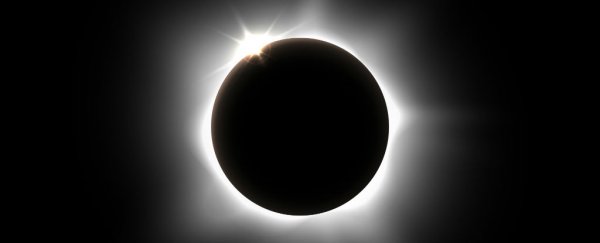As anyone who's ever read Tintin will know, total solar eclipses are so freaking cool, and depending on where you are in the world next week, you'll get to experience the dark shadow cast by the Moon passing exactly between the Sun and Earth in the early hours of March 8 to 9.
If you're due to be sacrificed to the Incan Sun God, it might be a good idea to schedule it for then. "You notice something off about the sunlight as you reach totality," says Sarah Jaeggli, a space scientist at NASA's Goddard Space Flight Centre. "Your surroundings take on a twilight cast, even though it's daytime and the sky is still blue."
Unfortunately for most of us, experiencing the full effect of a total solar eclipse will not be possible, thanks to where we are in the world, but if you happen to be in Indonesia, Papua New Guinea, Borneo, or the middle of the Pacific Ocean, you're in luck.
The eclipse will begin shortly after 6pm (AEST) over Indonesia and then move northeastwards for the next 3 or so hours over Borneo and then out over the Pacific Ocean.
The path the total solar eclipse will take is known as the path of totality, and it will cover an area of just 14,162 km (8,800 miles) long and 156 km (97 miles) wide at its widest point. Each place on the path of totality will experience darkness for 1.5 to 4 minutes.
"Though only people along the narrow path of totality will see the total eclipse, millions more will see some degree of a partial solar eclipse in Asia and the Pacific, including Hawaii, Guam, and parts of Alaska," says NASA. "A partial eclipse will also be visible along the path of totality for over an hour before and after the total eclipse."
ABC News reports that people living in northern Australia - basically anyone north of a line drawn between Perth and Rockhampton - will also get to see a partial solar eclipse on March 9.
Here's an animation of the solar eclipse's expected path next week:

If you don't plan on taking a last-minute vacation to the path of totality, you've still got some options to see this incredible cosmic phenomenon occur. Maddie Stone from Gizmodo recommends checking out this live broadcast from Micronesia, or heading to the Solar Dynamics Laboratory website for beautiful images of the eclipse when it happens.
For those of you on the US mainland who are bummed about missing this one, don't worry, you'll have your turn. Next year, the sky will go dark over the United States too.
The next total solar eclipse is due to occur on 21 August 2017, and it's going to be the first one visible from the contiguous United States since 1979, and will be visible from locations spanning from the East Coast to the West Coast. The last time this happened was during the 8 June 1918 total solar eclipse.
"The path of the … shadow begins in northern Pacific and crosses the US from west to east through parts of the following states: Oregon, Idaho, Montana, Wyoming, Nebraska, Kansas, Missouri, Illinois, Kentucky, Tennessee, North Carolina, Georgia, and South Carolina," says NASA, adding that a partial eclipse will be visible from a much larger region covering most of North America.
I guess that means if you're gonna trespass on sacred Incan burial grounds, do it then.
